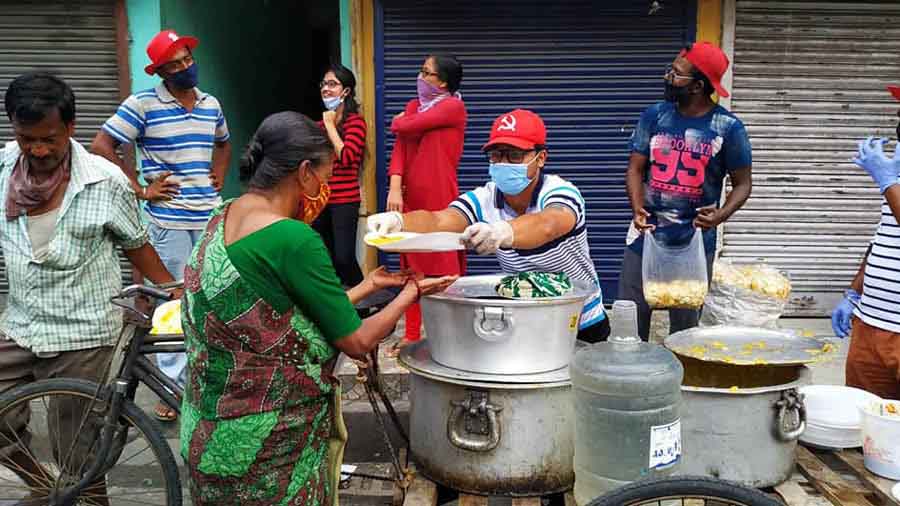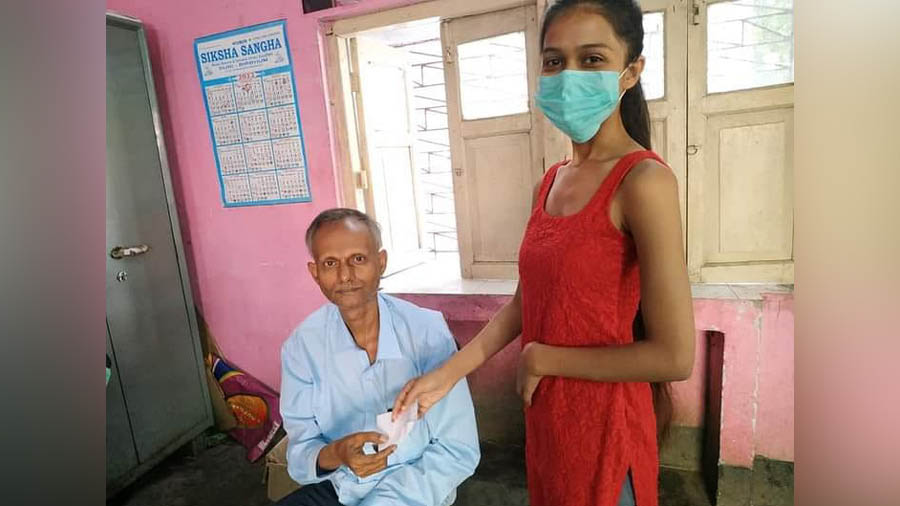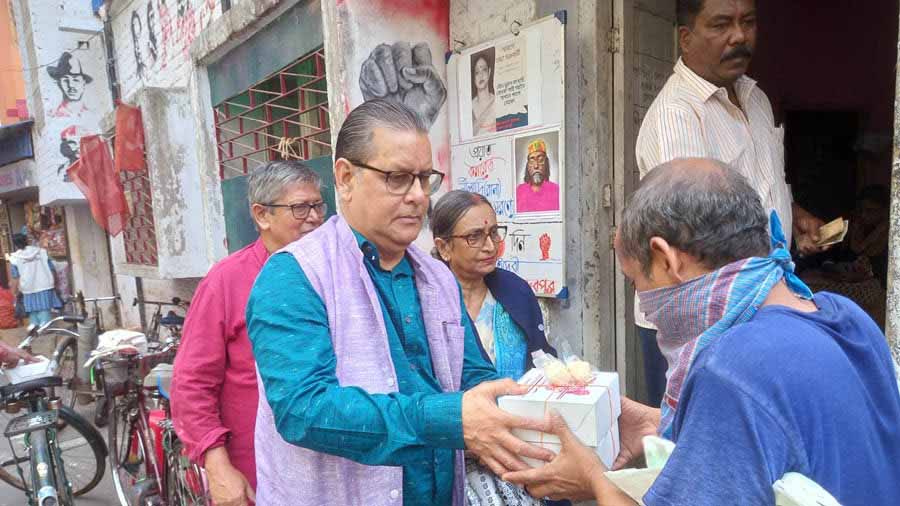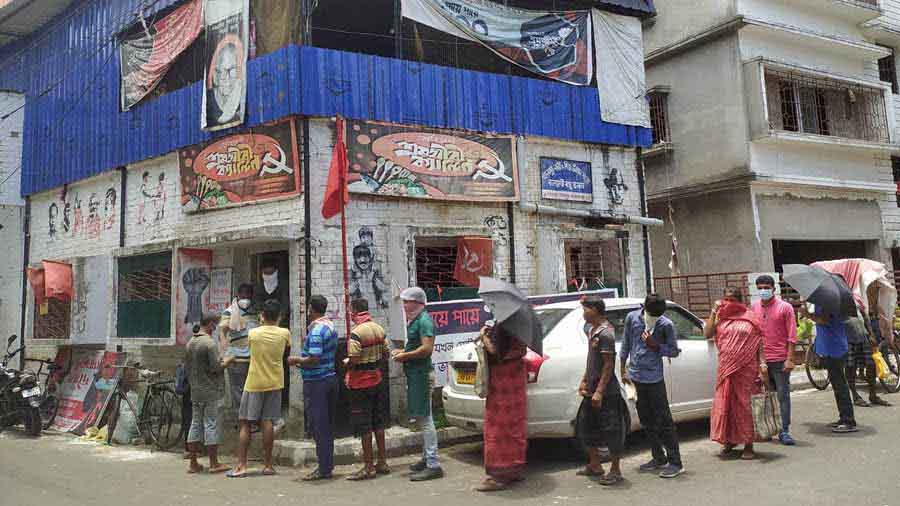Rickshaw-pullers, autorickshaw drivers, vegetable vendors, students and many others gathered at 12 Nabanagar in Jadavpur. Kolkata, on December 29 to express gratitude for seeing them through the lockdown days.
Jadavpur Sramajibi Canteen — a community kitchen — started running exactly 1,000 days ago. The goodwill, hard work and enterprise of a handful of youths ensured that thousands of common people didn’t have to starve during the pandemic.
Tentative start
Every day has been a test — from arranging funds, shopping and cooking to distribution. “During the first wave of COVID, we didn’t have any plans of distributing food. In fact, we wanted to help the local people of Jadavpur (Wards 96 and 99) with sanitisers. We had even bought the chemicals and started distributing them in bottles,” said Sanjay Bhattacharya, a businessman, who has been an active member of the canteen since Day I.
Soon, the members came face to face with the real crisis created by the lockdown. “There was no work and markets were closed. Ward 99 was dominated by the migratory labour population, who didn’t have any means of survival. We realised these people needed food more than sanitisers,” Bhattacharya said.
A short meeting later, it was decided to set up a mobile food van to distribute basic food items such as rice, dal and vegetable curry at a few prominent locations in the Jadavpur area. The idea was to serve fresh basic food to as many people as possible every day. That was the beginning of Sramajibi Canteen.

A woman receives a meal platter from a canteen member
Help from unexpected corners
Initially, the friends and the family members of the workers came forward to collect funds, but it was not enough. The number of people who needed help grew by the day and the initiative needed more money. As word spread, more and more people came forward to help. “A social media page was created around this time and it played a vital role. In no time, our phones and email accounts were flooded with messages from people from across the world eager to help,” said Anjan Chakraborty, college employee and an active member of CPI(M), who has been involved with the initiative.
Young members of the Students' Federation of India (SFI) and Democratic Youth Federation of India (DYFI), along with common people from all across the city, including Jadavpur University, came forward with financial and physical support. Similar canteens were also set up at different places in Howrah.

Ananjana Dutta, a young SFI worker, saved money to help out in the kitchen on her birthday
By the time the first lockdown was lifted, daily workers offered to provide financial assistance to the canteen. “We decided to accept a minimal price of Rs 20 per head for the food and the kitchen started running from this address in Nabanagar,” Bhattacharya said.
Sometimes food and sometimes money
Money, raw ingredients and even cooked food — help came in all forms, from all corners.
“Some took the responsibility of a day’s meal to mark auspicious occasions like birthdays, and weddings at their homes,” said Sudip Sengupta, a CPI(M) state Committee member, who has been working at the canteen since its inception.
Celebrities like filmmakers Anik Dutta and Kamaleswar Mukherjee, music composer Debojyoti Mishra, singer Arko Mukherjee, and actor Sabyasachi Chakrabarty have all pitched in and continue to do so.

Theatre actor Bimal Chakraborty distributes food at the canteen
Mishra got to know about the initiative from a newspaper article and called up Sengupta, expressing his wish to be a part of the initiative. “There was a time when I would go to the canteen every day. With the help of my driver Choton, I would roam around the city to find rice and stack it in my studio. Two things happened — for the first time I saw what hunger actually looked like. My personal problems seemed negligible before that and I was not depressed even for a single day during the lockdown,” Mishra said. “Hundreds of people like me came forward to help. One day Rinadi (Aparna Sen) called me to ask if we would accept her donation of Rs 1 lakh for the initiative and I didn’t know how to respond.”
Soujatya Roy Chowdhury, an employee of a cooperative bank, is one such person who helped the canteen. “The first time I saw the canteen running was in March/April 2020. I witnessed their struggle and have helped them on many occasions over the past two years. Recently, on my niece’s first birth anniversary, my brother Satrajit Roy Chowdhury, a private firm employee in Pune, and I decided to help the canteen properly. We paid for the cost of the food for a day and also went there physically to help in the process,” said Soujatya.
From canteen workers to Red volunteers
The relentless efforts of the workers have ensured the smooth operation of the canteen till the second wave of COVID hit.
“At first, our only job was to coordinate, collect the contact details of oxygen cylinder suppliers and ambulance services and send them to those who need them. But as the situation worsened, we had to come to the frontline and do almost everything,” said Sengupta, who along with many others worked day and night.
Students and youth members of SFI and DYFI started transporting oxygen cylinders, medicine and food to COVID-affected families. Starting from arranging for ambulances and hospital beds to sending food to the COVID-affected families, the Red volunteers did everything.
“All our members are working professionals and have families of their own. Even after attending office and family, they kept on working for the cause. As our phones were being flooded with calls and pleas for help, we took turns to receive calls 24X7 during those three months,” Sengupta said
Despite all the good work, several Red Volunteers faced harassment at times but Kolkata Police stepped in to help.
Going strong
The canteen at present has five or six regular employees for cooking and distribution besides volunteers. The regular employees are paid a salary every month from the community kitchen fund.

Even after the pandemic, one can spot long queues of people outside the canteen
“We wanted to keep it professional to maintain the quality. That’s why we needed some dedicated and experienced workers,” said Chakraborty.
While the quality remains the same, the price of food has recently been increased to Rs 25 from Rs 20 per head.
The canteen had pledged to serve 1,000 people on its 1000th day. And it did.
